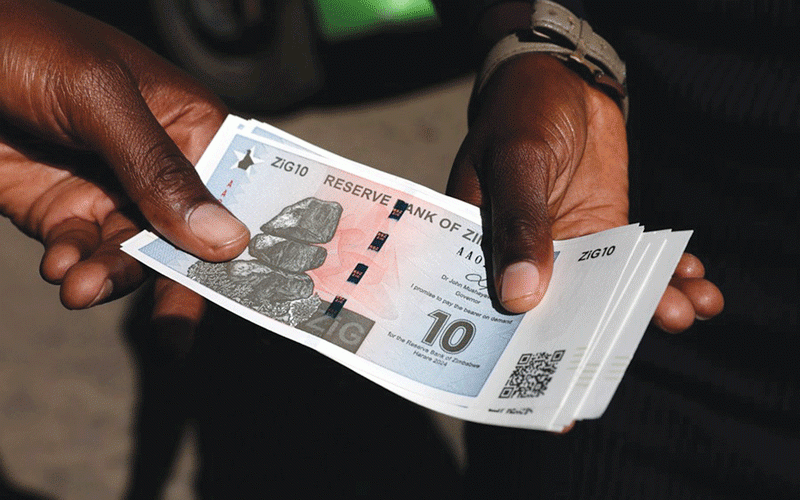
THE Reserve Bank of Zimbabwe (RBZ) yesterday devalued the Zimbabwe Gold (ZiG) to ZiG24,39 per dollar from ZiG13,99 in the biggest drop as monetary authorities buckled under pressure to dump the command exchange rate.
The devaluation comes amid a rise in premiums on the parallel market amid concerns the overvalued exchange rate would fuel arbitrage.
The dollar is trading at between ZiG35 and ZiG40 on the parallel market.
The devaluation comes barely a week after retailers warned of closure citing the exchange rate which was choking players.
They said suppliers of goods and services into the formal retail sector were maintaining a two-tier pricing regime for local currency and United States dollar whose implied rates are way higher than the obtaining official exchange rate based on the banking system's willing buyer willing seller.
Yesterday’s devaluation was accompanied by a pledge by the central bank to allow “greater exchange rate flexibility in line with increased demand for foreign currency in the economy”.
This followed a meeting of the RBZ’s Monetary Policy Committee which also resolved to reduce the amount of foreign currency an individual can take out of the country to US$2 000 from US$10 000.
The MPC increased the bank policy rate to 35% from 25%. The statutory reserves were increased and standardised statutory reserves for demand and call deposits for both local and foreign currency to 30%.
- Awards target married couples
- Awards target married couples
- Zimbabwe needs to rethink economic policies
- Zimbabwe needs to rethink economic policies
Keep Reading
“The statutory reserve requirements for savings and time deposits for both local and foreign currency have also been increased from 5% to 15%, with immediate effect,” RBZ governor John Mushayavanhu said in a statement.
Yesterday’s sharp devaluation is a blot on Mushayavanhu who, in his grand entry on April 5, had promised to be different from his predecessor declaring that “not under my watch” would the central bank engage in quasi-fiscal operations.
While lauding Mushayavanhu for the bold move, analysts say he was closing the stable while the horses have already bolted.
“This is an admission by the central bank in itself that the ZiG was overvalued. Now they are devaluing it. Then, the question is: Is it going to allow a stabilisation of the exchange rate? No, not at all. You can only stabilise the exchange rate if you have sufficient foreign currency reserves in the central bank,” economist Gift Mugano told NewsDay Weekender.
“I’m against the command exchange rate. I am against, again, the untimely introduction of the local currency. Where we are, we are just now seeing the central bank trying to ride the storm. They are in the midst of the storm.”
He said the storm was stronger than the authorities.
“They are going to be defeated by the storm. So, where we are is that they have just liberalised because they have no choice. They were supposed to have put enough reserves, US$4,5 billion,” Mugano said.
He said Ethiopia first received US$10 billion from the Bretton Woods institutions before they liberalised the exchange rate.
“So, what kind of people are we? We just liberalise or we introduce the currency when we don’t have enough reserves. So, this is going to be the final nail on the coffin,” Mugano added.
He said the authorities had now liberalised the exchange rate without sufficient reserves.
The five-month-old ZiG is backed by gold and forex currency reserves. Monetary authorities say the cover has increased to four from three when the currency was launched in April.









